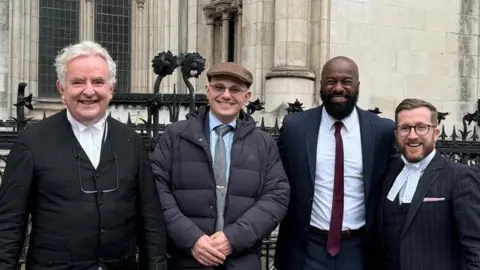Police ordered to pay £24,000 to Tasered driver
 Donoghue Solicitors
Donoghue SolicitorsA social worker Tasered by police in central London will receive £24,000 in compensation after successfully challenging a ruling dismissing his claim in the Court of Appeal.
Edwin Afriyie, 37, took legal action after he was Tasered by a City of London Police officer in King William Street in April 2018.
Mr Afriyie claimed he suffered head, back and leg injuries due to being Tasered and falling to the ground, banging his head on a stone ledge.
The force said it was "disappointed by the ruling".
In a statement it added that it would "need to take time to consider our next steps before we can comment further".
Mr Afriyie was stopped by police on suspicion of driving at excessive speed and was eventually detained for failing to supply a sample of breath.
Mr Afriyie was charged with failure to provide a specimen for analysis but was not convicted of the driving offence.
A High Court trial heard last year that Mr Afriyie was standing with his arms folded while talking to a friend when he was Tasered and footage showed him falling backwards, landing with his head on a step and his body on the pavement.
High Court judge Mrs Justice Hill found the use of the firearm was reasonable in the circumstances, however Mr Afriyie took the case to the Court of Appeal and on Friday, three senior judges ruled the use of the Taser was not "objectively reasonable" and damages should be awarded.
Taser use 'not objectively reasonable'
In a ruling Lord Justice William Davis, sitting with the Lady Chief Justice Baroness Carr and Lord Justice Dingemans, said Mr Afriyie "was standing and talking to his friend" before the Taser was fired.
"A proper objective analysis of whether using a weapon classified as a firearm was reasonable would have led the judge to conclude that it was not.
"Her conclusion that further negotiation would have been futile did not amount to the necessary analysis of objective reasonableness of the nature and degree of force used."
Agreeing with the ruling, Baroness Carr said: "Tasers are prohibited firearms. They are potentially lethal weapons."
"The use of a Taser on the appellant, who at the time of discharge was standing still in a non-aggressive stance with his arms folded and talking to his friend, was not objectively reasonable in the circumstances."
'Severe emotional toll'
Mr Afriyie’s solicitor Kevin Donoghue said: "I hope that this judgment, the first of its kind in England and Wales, brings home to the police the risks associated with the use of Tasers.
"Tasers are firearms and can have serious consequences, as Mr Afriyie found.
"The judgment should reassure the public that victims of unlawful use of force will take aggressive action to hold the police to account."
He added: "This six-year pursuit of justice has caused a severe emotional toll on Ed.
"The City of London Police should have accepted liability shortly after the incident occurred, instead of wasting thousands of pounds of taxpayer’s money defending its officer’s conduct."
Listen to the best of BBC Radio London on Sounds and follow BBC London on Facebook, X and Instagram. Send your story ideas to [email protected]
